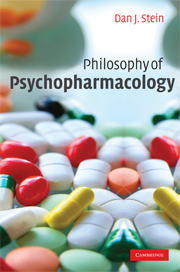Book contents
- Frontmatter
- Contents
- Preface
- 1 Psychopharmacology – a remarkable development
- 2 Philosophical questions raised by psychopharmacology
- 3 How to think about science, language, and medicine: classical, critical, and integrated perspectives
- 4 Conceptual questions about psychotropics
- 5 Explanatory questions about psychotropics
- 6 Moral questions about psychotropics
- 7 Conclusion
- References
- Index
1 - Psychopharmacology – a remarkable development
Published online by Cambridge University Press: 13 August 2009
- Frontmatter
- Contents
- Preface
- 1 Psychopharmacology – a remarkable development
- 2 Philosophical questions raised by psychopharmacology
- 3 How to think about science, language, and medicine: classical, critical, and integrated perspectives
- 4 Conceptual questions about psychotropics
- 5 Explanatory questions about psychotropics
- 6 Moral questions about psychotropics
- 7 Conclusion
- References
- Index
Summary
Psychopharmacology, the study of psychotropics, or brain-mind-altering substances, is a fascinating field at the confluence of neurochemistry and behaviour. Basic psychopharmacologists are mostly interested in how psychotropics work, often studying neurochemical properties of different compounds in animal models. Clinical psychopharmacologists are mainly interested in the clinical applications of psychotropics, often working in psychiatric settings. But what exactly are psychotropics? How in fact do they work? How widely are they used, and do they really help people?
In this chapter I begin by outlining the broad scope of psychopharmacology: emphasizing that psychotropics have been long, widely, and intensively used by humankind for a range of purposes; describing the relatively recent birth of modern psychopharmacology as an empirical science; and noting that despite the remarkable progress in the field to date, psychopharmacology is at an early stage in its development. Then, in the next chapter I go on to consider the major philosophical issues raised by the advent of modern psychopharmacology.
The length, breadth, and depth of psychotropic use
And he drank of the wine, and was drunken; and he was uncovered within his tent.
(Genesis 9:21, King James Version)What is better adapted than the festive use of wine, in the first place to test, and in the second place to train the character of a man, if care be taken in the use of it?
(Plato, 1970)Humans use psychotropic agents in a range of different contexts.
- Type
- Chapter
- Information
- Philosophy of Psychopharmacology , pp. 1 - 10Publisher: Cambridge University PressPrint publication year: 2008



